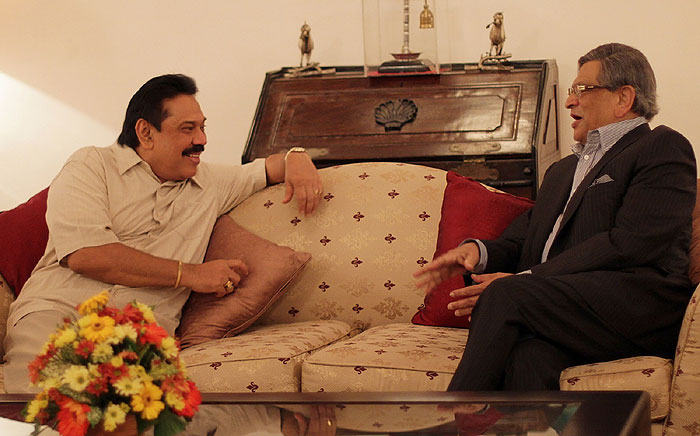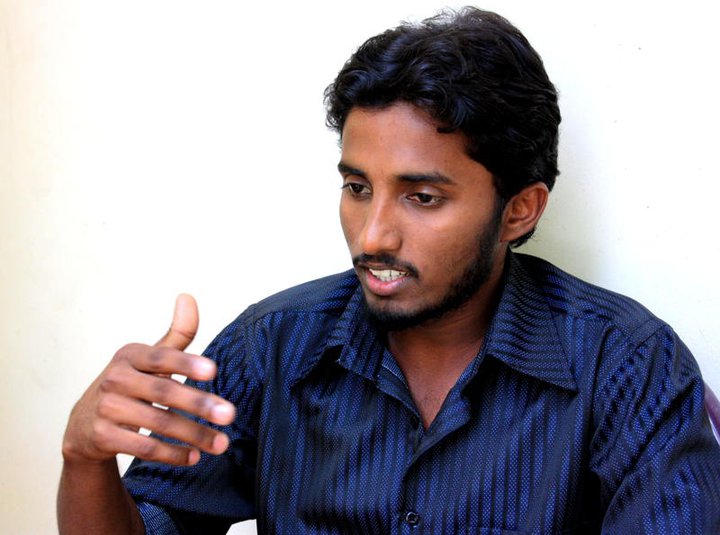
BBC News
.............................................................................................................................................................................................
S.M. Krishna said he hoped that the president would embark on "the quest for genuine political reconciliation".
Sri Lankan government forces defeated Tamil Tiger rebels fighting for a separate homeland in May 2009 after 26 years of civil war.
MPs recently received a report from a domestic inquiry into the war.
The Lessons Learnt and Reconciliation Commission (LLRC) was widely dismissed by international human rights groups. But the government insisted that it would get to the bottom of human rights violations that may have been committed during Sri Lanka's brutal conflict.
After the war, many observers argued that reform was a crucial ingredient for any kind of political reconciliation.
Reform recommendations
The BBC's Charles Haviland in Colombo says that India has been keeping an eye on ongoing talks between the Sri Lankan government and the biggest Tamil party - talks which may lead to constitutional reforms including substantial regional devolution, which the Tamil party wants given that the north and east are Tamil-dominated.
Addressing the media with his Sri Lankan counterpart, Mr Krishna said he hoped that Sri Lanka's President Mahinda Rajapaksa would use what he called his vision and leadership in "the quest for genuine political reconciliation".
He added that Colombo should move forward, now that its domestic war commission had made a series of recommendations on reform.
"These recommendations, when implemented, would mark a major step forward in the process of genuine national reconciliation. Sri Lanka must seize this opportunity," Mr Krishna said.
The Indian foreign minister said Mr Rajapaksa had assured him of his commitment to implement such devolution.
But Sri Lankan Foreign Minister G.L. Peiris did not confirm this, and said it was important to broaden the talks out to include all political parties, our correspondent reports.
India is generally supportive towards Sri Lanka, but sometimes makes mild criticisms of its smaller neighbour on human rights issues - influenced in part by its having an ethnic Tamil population numbering tens of millions.
Analysts say it is also in competition with China for influence in the island, and Beijing is currently funding a series of huge development schemes through loans.
Last year India's Congress Party president, Sonia Gandhi, said: "In our neighbourhood, there is no issue closer to our heart than the Sri Lankan Tamils issue."
© BBC News
Wednesday, January 18, 2012
India presses Sri Lanka on political reform
Wednesday, January 18, 2012
Sri Lanka’s game of diplomacy

By Gibson Bateman | Journal of Foreign Relations
.............................................................................................................................................................................................
The Action Plan was developed in accordance with a commitment the government had made in 2008, the last time Sri Lanka participated in the UN’s Universal Periodic Review.
Both documents are part of the Sri Lankan government’s strategy to placate international observers and convince people that there is no need for any kind of international assistance because the country’s domestic institutions are working just fine.
Like the LLRC report, the National Action Plan contains some decent recommendations, but it is replete with missing and false information. For example, the section on the Prevention of Torture is laughable and worrisome.
The Sri Lankan government claims that it “maintains a zero-tolerance policy on torture.” This sweeping assertion directly contradicts loads of evidence, including the recent findings of the UN’s Committee Against Torture (CAT).
The fact that the Ministry of Defense has been denoted as the “Key Responsible Agency” for ensuring the prevention of torture is perhaps more disconcerting.
The front-page story in this week’s Sunday Leader, which explains “that that some 500 people have been reported missing in the North and East alone over the past few years” should give people good reason to worry.
The rule of law continues to deteriorate under President Mahinda Rajapaksa’s watch.
The government will present its National Action plan to the UN’s Human Rights Council’s (HRC) 19th session in March.
What Will Happen in Geneva?
In theory, Rajapaksa’s administration has plenty to worry about. Lobbying and debate surrounding the next session of the HRC has already begun.
Many foreign governments recently made strong statements that the LLRC’s final report does not touch on the question of accountability. The Sri Lankan government refuses to look into credible claims that violations of international humanitarian law occurred at the end of the war; government officials are unwilling to go into any detail about what actually happened during the last phase of the conflict.
Strident calls for an international mechanism will be made this spring in Geneva. If no resolution gets through either of the next two sessions of the HRC (another session will be held this summer), then Rajapaksa’s government can probably rest easy as long as they stay in power.
Diplomacy is not always a zero-sum game, but Rajapaksa’s government knows that the final report of the LLRC and the National Action Plan are its two most potent lobbying weapons, as long as government officials continue to bend the truth or promulgate outright lies.
This is ironic because both documents distort reality and should actually be used against the government. They reinforce the notion that Rajapaksa’s administration does not care about human rights.
The processes surrounding the drafting and the finalization of the LLRC and the National Action Plan were deeply flawed and not at all independent. The LLRC’s lack of independence is well-known. (President Mahinda Rajapaksa appointed the eight-member Commission himself). The true story about the National Action Plan appears to be less widely understood, especially outside of Sri Lanka.
The government’s drafting of the National Action Plan was quite devious.
A number of civil society leaders, academics and genuinely independent thinkers were included in the eight-committee body during the initial process and the composition of the first draft of the National Action Plan. Yet committee members were not involved in the process after that.
Now, the Sri Lankan government is falsely claiming that the National Action Plan was the result of a thoughtful, inclusive process. This is absurd.
As Rohan Edrisinha (a member of one of the drafting committees) has already indicated, that was not what happened.
Drafting committee members never did approve the final document, only the first draft.
In another clever ploy, this “watered down” version is being heralded as a step in the right direction.
Few people are speaking out about this issue because they are afraid to do so.
Rajapaksa’s government has benefited from a fragmented political opposition for years.
Divisions within Sri Lankan civil society only make the government’s consolidation of power that much easier.
In addition to some lively debate at the Human Rights Council, Sri Lanka’s human rights record will also be examined under the UN’s Universal Periodic Review (UPR) this year.
The government’s propaganda machine is already in full swing. Sri Lankan diplomats will welcome many foreign dignitaries in January and February.
President Rajapaksa and senior government officials will use these visits as a platform to prepare a more complete misinformation campaign for Geneva in late February and early March.
The Sri Lankan government will be touting both the LLRC and the National Action Plan as wonderful examples of how just and satisfactory things are in Sri Lanka.
The idea is farcical.
In January of 2010, the IMF declared Sri Lanka a Middle Income country. The war has been over for more than two years. International observers and NGOs are moving on to the next crisis: Libya, Egypt, Tunisia or elsewhere. A new disaster or humanitarian catastrophe is always right around the corner.
Nonetheless, what happened in Sri Lanka in 2009 cannot be brushed aside. One does not sweep ethnic tension under the rug and wait idly by, hoping that it disappears.
Looking Ahead
Again, in spite of the LLRC’s complete exoneration of the military, the report does contain some good recommendations about devolution, land rights, compensation for victims/survivors and demilitarization.
There are some decent recommendations in the National Action Plan as well.
However, the chances that the Sri Lankan government will swiftly move to implement any of the solid recommendations are infinitesimal. Rajapaksa’s government has shown its unwillingness to follow through on almost all the agreements it made during the last session of the Universal Periodic Review in 2008.
It disregarded the LLRC’s interim recommendations as well.
The word “recommendation” in Sri Lankan political parlance is meaningless. Why should anyone be optimistic this time around?
Forget recommendations, the government continues to ignore its own constitution.
To take one example, President Rajapaksa’s intractable position on the devolution of power to the country’s Northern and Eastern provinces, something that is clearly articulated in the 13th Amendment of the country’s constitution, is not helping. Nor is the government’s current dialogue with the Tamil National Alliance (TNA), which is starting to look more like a scene from Waiting for Godot and less like any semblance of political negotiation with each passing day.
Despite some claims to the contrary, Mahinda Rajapaksa is not (yet) Robert Mugabe and Sri Lanka is not Zimbabwe. But this government has undoubtedly become more authoritarian since the end of the war. Just because the country has a history of “democracy” does not mean that continued democratic governance is a foregone conclusion. The erosion of checks and balances since 2009 has been significant. The passage of the 18th Amendment in 2010 reinforced this, as that legislation pulled even more power to the executive.
Giving Rajapaksa’s government a free pass on human rights empowers aspiring autocrats everywhere. It sends a clear signal to semi-authoritarian governments: Go ahead, do whatever you want; you will face no consequences for your actions.
© JOFR
Wednesday, January 18, 2012
IUSF convener’s life in danger - MFPS

Sri Lanka Mirror
.............................................................................................................................................................................................
MFPS coordinator Duminda Nagamuwa told ‘Srilankamirror’ that the TID officers had threatened the activists present, claiming that they were harbouring underworld operatives.
However, they had refused to prove their identities and said they were searching for the underworld operative ‘Sanjeewa.’
The TID has admitted that the person they were referring to is IUSF convener Sanjeewa Bandara.
Mr. Nagamuwa said therefore, the life of the IUSF convener is in danger, adding that a complaint has been lodged with Homagama police regarding the matter.
© Sri Lanka Mirror
This site is best viewed with firefox

Search
Is this evidence of 'war crimes' in Sri Lanka?
Archive
- ► 2010 (1312)
- ► 2011 (687)
Links
- Reporters Sans Frontières
- Media Legal Defence Initiative
- International Press Institute
- International News Safety Institute
- International Media Support
- International Freedom of Expression eXchange
- International Federation of Journalists
- Committee to Protect Journalists
- Asian Human Rights Commission
- Amnesty International















